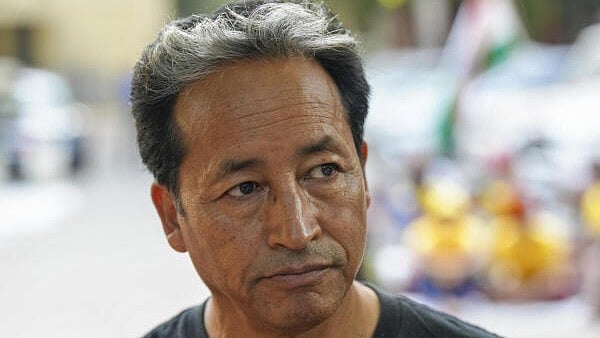
Sonam Wangchuk
Credit: PTI Photo
Srinagar: Climate activist and education reformer Sonam Wangchuk, along with the Leh Apex Body (LAB), on Wednesday announced a 35-day fast in Ladakh, intensifying their agitation for statehood and inclusion of the Union Territory under the Sixth Schedule of the Constitution.
Addressing media persons in Leh, Wangchuk said the decision to escalate the protest came after the Union Home Ministry stopped engaging with Ladakhi representatives.
“Despite repeated assurances, there have been no talks for nearly two months. Just when discussions were about to reach the stage of addressing our core demands, the government stopped calling meetings,” he said.
Wangchuk stressed that the fast was not a step taken lightly but a compulsion born out of the Centre’s "indifference". “We are being forced to intensify the movement demanding statehood for Ladakh and constitutional safeguards to protect our land, jobs and fragile environment,” he said.
Since Ladakh was carved out as a Union Territory in August 2019 following the abrogation of Article 370 and bifurcation of Jammu and Kashmir, civil society groups in the cold desert region have repeatedly voiced fears over loss of land rights, cultural identity and employment opportunities.
Both the Leh Apex Body and the Kargil Democratic Alliance (KDA) – umbrella groups of local political, religious and student organisations – have been spearheading the agitation for statehood and Sixth Schedule status, which provides autonomy to tribal areas for safeguarding their resources and traditions.
Wangchuk, who has emerged as the most prominent face of this movement, has been consistently pressing for constitutional protections. Earlier this year, he joined a three-day hunger strike in Kargil to underline the demand.
The announcement of the fast also comes against the backdrop of a recent row over land allotted to Wangchuk’s Himalayan Institute of Alternative Learning (HIAL). On August 21, the Ladakh administration cancelled a 2018 allotment of 135 acres at Phyang village in Leh, citing violation of conditions.
An order issued by Leh Deputy Commissioner Romil Singh Donk said the land, leased for 40 years to HIAL for setting up a university, had neither been formally handed over nor used for the intended purpose. The administration maintained that the lease deed was never executed and the allotment had lapsed in May 2019.
HIAL, however, describes itself as a pioneering initiative aimed at turning Ladakh into a model of sustainable mountain living, with a focus on innovative education, green technologies and local empowerment.
For many in Ladakh, the land row is symptomatic of a deeper disconnect between New Delhi and the local population. “Instead of addressing our genuine constitutional concerns, the government is cancelling projects that are meant for the region’s sustainable future,” said a member of the Leh Apex Body.
The LAB and KDA had earlier held several rounds of talks with the Home Ministry, raising hopes of a breakthrough. But with negotiations now stalled and the administration tightening its grip on local institutions, the movement appears to set for another prolonged phase of protests.
The 35-day fast, activists say, will serve as a reminder that Ladakh’s demand for statehood and Sixth Schedule status cannot be indefinitely ignored.